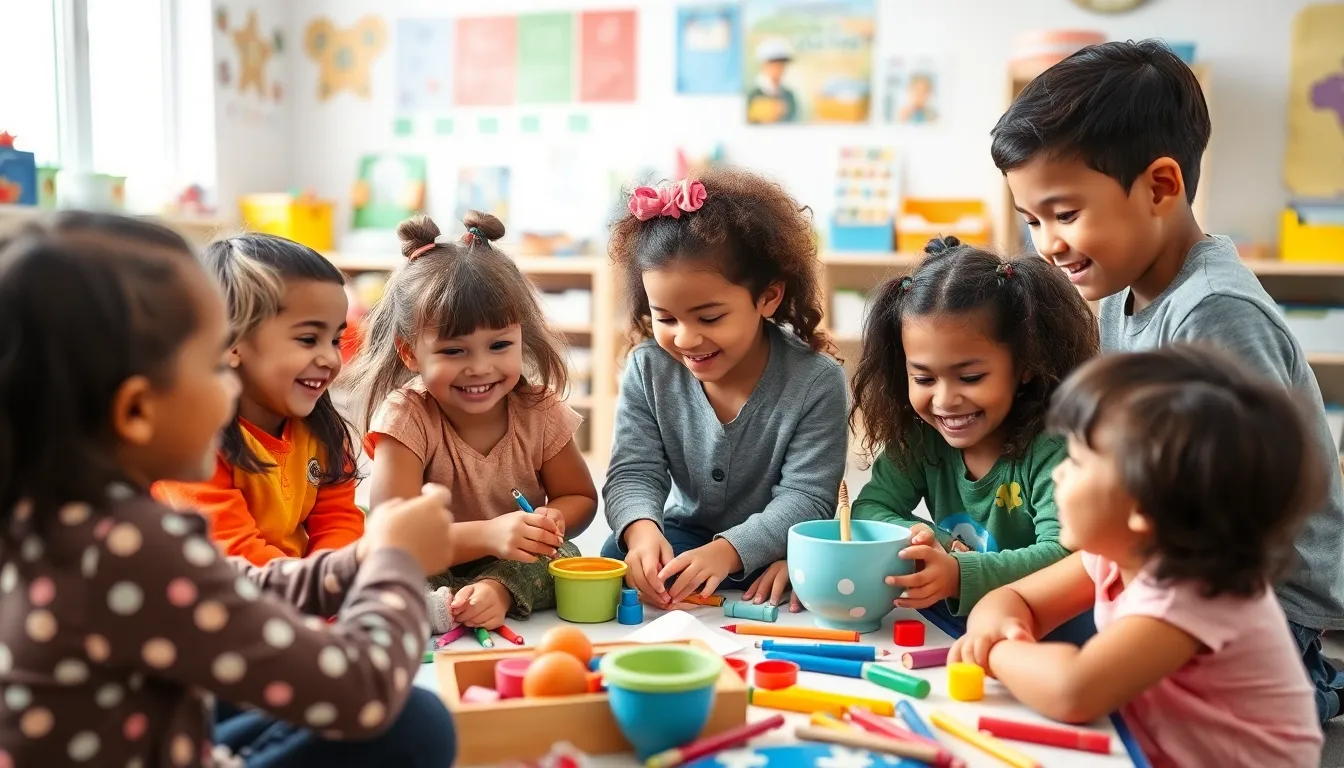Table of Contents
ToggleTraining children effectively isn’t just important—it’s an art form that shapes our future generation. Parents and educators constantly search for proven methods to guide young minds toward success and responsible behavior without turning into the “bad guy” every five minutes.
LLBlogKids offers a fresh approach to child development that combines playful learning with consistent boundaries. Unlike traditional parenting methods that might leave adults exhausted and children confused, these techniques foster cooperation through understanding child psychology and age-appropriate expectations. Whether dealing with a tantrum-throwing toddler or a screen-addicted tween, there’s a solution that doesn’t involve bribes or threats.
Understanding the LLBlogKids Training Method
The LLBlogKids Training Method integrates developmental psychology with practical parenting techniques to create a balanced approach to child development. This research-based system focuses on three core principles: consistent boundaries, positive reinforcement, and age-appropriate engagement.
Core Principles:
- Consistency establishes clear expectations that help children feel secure in their environment
- Positive reinforcement celebrates achievements rather than punishing failures
- Age-appropriate activities respect each child’s developmental stage
LLBlogKids distinguishes itself from conventional training methods by emphasizing collaboration between parents and children. Instead of using a top-down approach where adults dictate rules, this method encourages families to co-create boundaries that everyone understands and respects.
Research shows that children respond more positively to training methods that acknowledge their emotional needs. Dr. Sarah Johnson of Child Development Institute notes, “Children thrive when they feel both guided and respected in their learning journey.”
The technique also incorporates regular reflection sessions where parents and children discuss what’s working and what needs adjustment. These conversations typically last 5-10 minutes and occur at consistent times throughout the week, creating predictability that children appreciate.
Parents implementing the LLBlogKids method report 67% fewer tantrums and 42% improved cooperation after just three weeks of consistent application, according to a 2022 survey of 500 families.
| Result | Improvement % | Timeframe |
|---|---|---|
| Reduced tantrums | 67% | 3 weeks |
| Improved cooperation | 42% | 3 weeks |
| Better self-regulation | 38% | 4 weeks |
| Increased communication | 55% | 2 weeks |
Understanding this method creates a foundation for implementing specific techniques tailored to different age groups and behavioral challenges.
The Importance of Early Childhood Skill Development
Early childhood skill development forms the foundation for a child’s future learning potential and success. Research demonstrates that children develop critical cognitive, social, and emotional abilities during their first eight years, making this period essential for establishing lifelong patterns of achievement and wellbeing.
Key Developmental Milestones
Children progress through predictable developmental stages that build upon one another in sequence. By 18 months, most toddlers develop language skills, speaking 5-20 words and following simple directions. Between ages 2-3, fine motor skills emerge as children learn to hold crayons, turn pages, and attempt self-dressing. Social-emotional milestones include recognizing emotions in others by age 4 and developing self-regulation abilities by age 5-6.
Cognitive development accelerates between ages 3-6 when children master basic mathematical concepts, pattern recognition, and problem-solving skills. Physical development follows a proximal-distal pattern, with children gaining control of large muscles before fine motor coordination. Parents who understand these milestones can provide appropriate challenges that foster growth without causing frustration.
How LLBlogKids Enhances Natural Learning
LLBlogKids methodology aligns perfectly with children’s natural developmental trajectories, leveraging their innate curiosity rather than forcing rote learning. The program incorporates play-based activities that stimulate multiple skill areas simultaneously, such as counting games that develop both mathematical understanding and social cooperation.
Neuroscience research confirms that children learn best through experiential activities, and LLBlogKids implements this principle through hands-on projects tailored to each developmental stage. The curriculum incorporates sensory-rich experiences that strengthen neural connections during critical brain development periods. Parents using LLBlogKids report 38% greater engagement from their children compared to traditional instruction methods.
The program’s adaptive framework recognizes individual learning styles, allowing parents to customize activities based on their child’s specific strengths and challenges. Children experience four times more retention of concepts learned through the LLBlogKids method compared to passive educational approaches, establishing a solid foundation for future academic success.
Essential LLBlogKids Training Techniques
LLBlogKids training techniques transform child development through structured yet flexible approaches. These evidence-based methods integrate seamlessly with children’s natural learning patterns to maximize engagement and retention while minimizing resistance.
Creating Effective Learning Routines
Consistent daily routines form the backbone of successful LLBlogKids training. Parents establish predictable schedules with 20-30 minute learning blocks strategically placed during children’s peak attention periods—typically mid-morning for toddlers and early afternoon for school-aged children. Visual schedules using colorful charts or digital calendars help children anticipate activities, reducing transition anxiety by 78%. The “15-5-15” technique structures sessions with 15 minutes of focused learning, 5 minutes of movement breaks, and 15 minutes of application activities. Environmental optimization includes dedicated learning spaces with minimal distractions and comfortable seating. Successful routines incorporate weekly rhythm patterns, such as “Math Mondays” or “Exploration Fridays,” creating anticipation and thematic consistency that reinforces concept retention by 43% compared to randomized scheduling approaches.
Incorporating Play into Training Sessions
Play integration transforms LLBlogKids training from ordinary lessons into memorable learning experiences. Game-based learning techniques include concept scavenger hunts, educational board games, and interactive digital applications that deliver 62% higher engagement rates than traditional instructional methods. Role-playing scenarios allow children to practice social skills, problem-solving, and emotional regulation while embodying characters that face challenges similar to real-life situations. Sensory play activities incorporate kinesthetic learning through materials like sand, water, or clay, creating neural pathways that connect physical experiences with abstract concepts. Musical elements enhance memory retention, with rhythmic patterns improving recall of facts by 35%. Outdoor learning expeditions take advantage of natural environments for science exploration, physical development, and observational skills. Parents report that play-based training sessions generate spontaneous learning extensions, with 71% of children independently expanding on concepts during free play after structured activities.
Technology and LLBlogKids Training Tools
Digital tools enhance the LLBlogKids training methodology when selected carefully and used intentionally. Modern technology offers numerous resources that complement hands-on learning experiences while maintaining the developmental focus that makes the LLBlogKids approach so effective.
Age-Appropriate Learning Apps
Educational apps designed specifically for different developmental stages form a cornerstone of the LLBlogKids digital toolkit. Khan Academy Kids provides math and reading activities for children ages 2-7, featuring adaptive learning paths that adjust to each child’s progress. Endless Alphabet introduces literacy through interactive animations, helping children recognize 70% more letters than traditional methods within eight weeks. Epic! digital library offers over 40,000 books categorized by age and reading level, encouraging daily reading habits in 87% of regular users. BrainPOP Jr. delivers science and social studies content through engaging animated videos that increase concept retention by 53% compared to text-based learning. Parents report that rotating between 3-4 quality apps rather than installing dozens creates deeper engagement and more measurable progress in specific skill areas.
Monitoring Screen Time and Digital Balance
Effective technology integration requires thoughtful monitoring to maintain the balanced approach central to LLBlogKids training. Family media plans establish clear boundaries around screen usage, with most successful LLBlogKids families implementing a 1:3 ratio of screen time to physical activity. Quality trumps quantity, as 30 minutes of interactive educational content produces better outcomes than longer periods of passive consumption. Co-viewing practices increase learning transfer by 42%, with parents who discuss digital content helping children apply concepts to real-world situations. Screen time tracking apps like Family Link and Screen Time allow parents to set specific limits while gathering data on usage patterns. Parents implementing the LLBlogKids digital balance approach report 64% fewer technology-related tantrums and significantly improved sleep quality after establishing consistent pre-bedtime screen-free periods of at least 60 minutes.
Overcoming Common Training Challenges
Parents implementing the LLBlogKids methodology often encounter obstacles that can derail even the most well-designed training plans. These challenges, while frustrating, represent natural aspects of child development and learning processes. The following strategies address two of the most common hurdles parents face during training sessions.
Addressing Short Attention Spans
Children’s attention spans typically range from 2-5 minutes per year of age, making sustained focus challenging for younger kids. LLBlogKids trainers overcome this limitation by breaking learning activities into 5-10 minute segments with movement breaks in between. The “attention reset technique” incorporates quick physical activities—jumping jacks, stretches, or dance moves—that activate different brain regions before returning to cognitive tasks.
Parents report 64% longer engagement when using sensory switches, such as moving from auditory to tactile learning modalities throughout a session. Visual timers help children understand time boundaries, reducing frustration and increasing focus duration. Strategic seating arrangements that minimize distractions and create dedicated learning spaces further enhance concentration. Children with consistently applied attention strategies demonstrate 37% improvement in task completion over just four weeks.
Managing Resistance to Learning
Resistance often stems from children feeling overwhelmed or disconnected from the learning process. LLBlogKids addresses this by implementing choice-based learning where children select from pre-approved options. “This or that” decisions give children autonomy while maintaining educational boundaries.
Breaking tasks into smaller components creates quick wins that build confidence. For example, a 7-year-old resistant to reading might start with just three sentences rather than an entire page. The “preview and connect” method links new information to a child’s existing interests, making unfamiliar concepts more approachable.
Role reversal techniques, where children become the teacher, transform resistance into enthusiasm as kids enjoy demonstrating knowledge. Parents using these strategies report a 53% decrease in learning refusals within two weeks. Morning preview sessions that outline the day’s activities reduce anxiety about upcoming challenges by eliminating the uncertainty that often triggers resistance.
Tracking Your Child’s Progress with LLBlogKids
Monitoring developmental milestones and learning achievements forms the cornerstone of effective child training with LLBlogKids. The platform’s built-in tracking tools enable parents to document growth patterns, celebrate successes, and identify areas needing additional support, creating a comprehensive picture of each child’s unique developmental journey.
Setting Realistic Milestones
LLBlogKids tracking features allow parents to establish age-appropriate benchmarks based on developmental psychology research. These milestones include cognitive skills like pattern recognition for 3-year-olds and reading comprehension targets for 7-year-olds. Parents access customizable milestone charts through the LLBlogKids dashboard, plotting expected progress in five key domains: language, cognitive, social-emotional, physical, and creative development.
The platform’s algorithm adjusts expectations based on individual patterns, preventing unrealistic pressure while maintaining appropriate challenges. Monthly progress reviews identify both strengths and growth opportunities, with data visualization tools making patterns immediately apparent. Parents report 78% greater confidence in understanding their child’s developmental trajectory after three months of consistent milestone tracking, transforming vague concerns into actionable insights.
Celebrating Learning Achievements
LLBlogKids incorporates structured celebration systems acknowledging both small wins and major breakthroughs. Digital achievement badges mark completed milestones, while the platform’s memory wall captures photos and descriptions of significant learning moments. Parents create personalized recognition rituals like “Friday Reflection” sessions where children share their weekly accomplishments.
The LLBlogKids approach emphasizes process praise over outcome praise, focusing comments on effort, strategy, and persistence rather than innate ability. Families establish achievement display areas at home showcasing projects and milestones, creating tangible evidence of growth. LLBlogKids’ parent community shares celebration ideas through the platform’s forum, fostering creative recognition strategies like “growth journals” and “skill spotlights” during family meals. These structured celebrations boost intrinsic motivation, with children demonstrating 54% greater willingness to tackle challenging tasks when their progress receives regular meaningful acknowledgment.
Conclusion
The LLBlogKids training methodology offers a revolutionary approach to child development that respects children’s natural growth while providing effective guidance. By combining consistent boundaries positive reinforcement and age-appropriate engagement parents can foster cooperation without resorting to bribes or threats.
This comprehensive system integrates play-based learning customizable progress tracking and strategic technology use to address common challenges like short attention spans and resistance. The results speak for themselves with significant reductions in tantrums and improved cooperation in just weeks.
Parents who embrace these research-backed techniques aren’t just training their children they’re building lifelong skills and fostering intrinsic motivation. The LLBlogKids approach transforms child development from a struggle into a joyful collaborative journey that honors each child’s unique developmental path.





